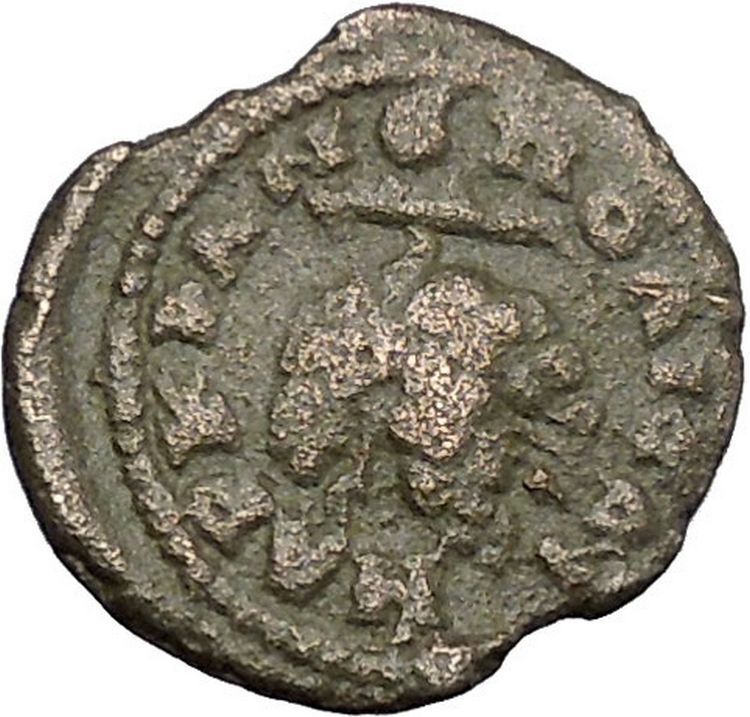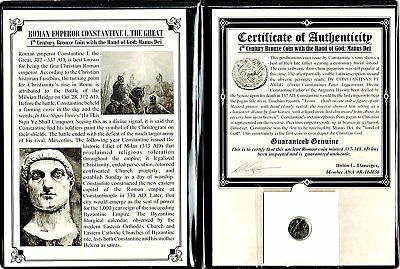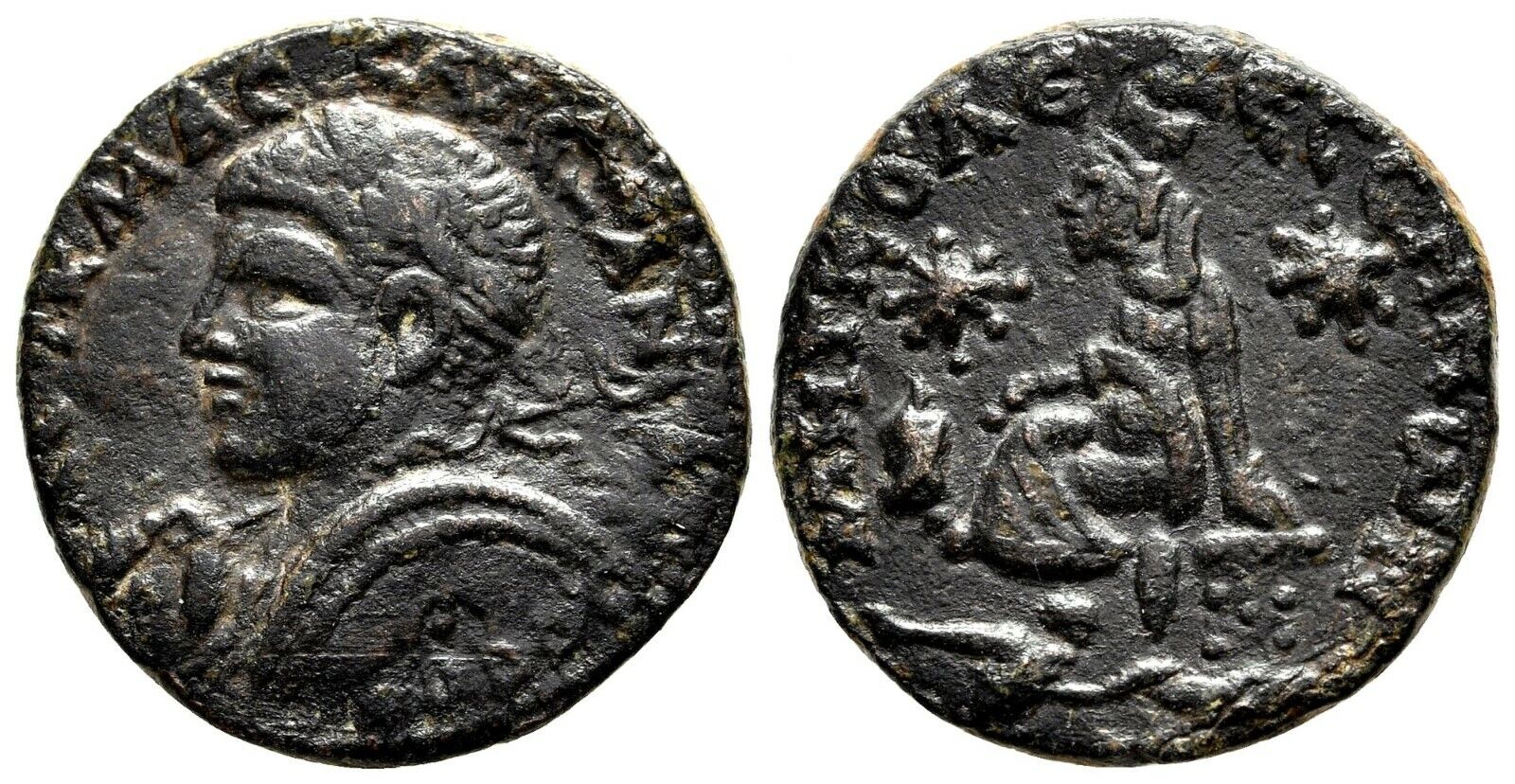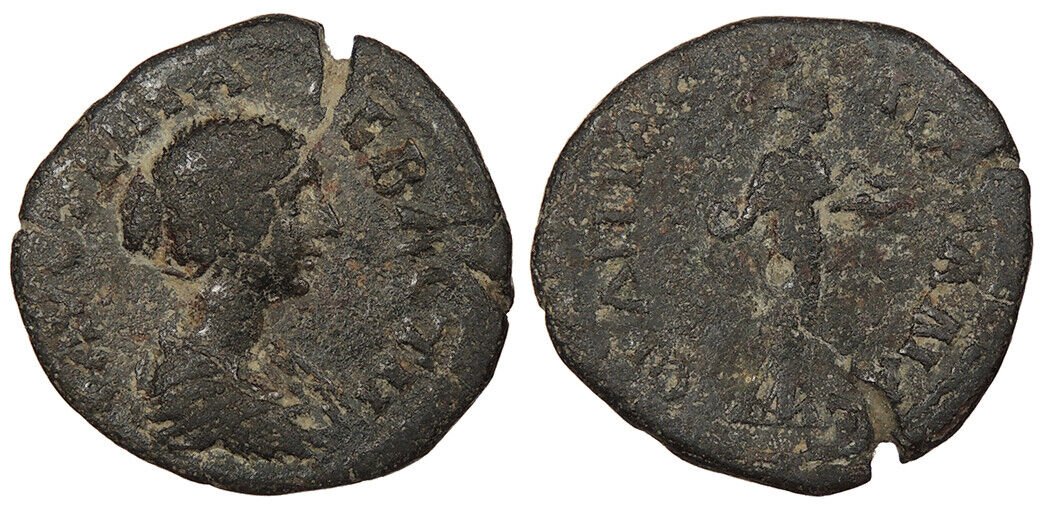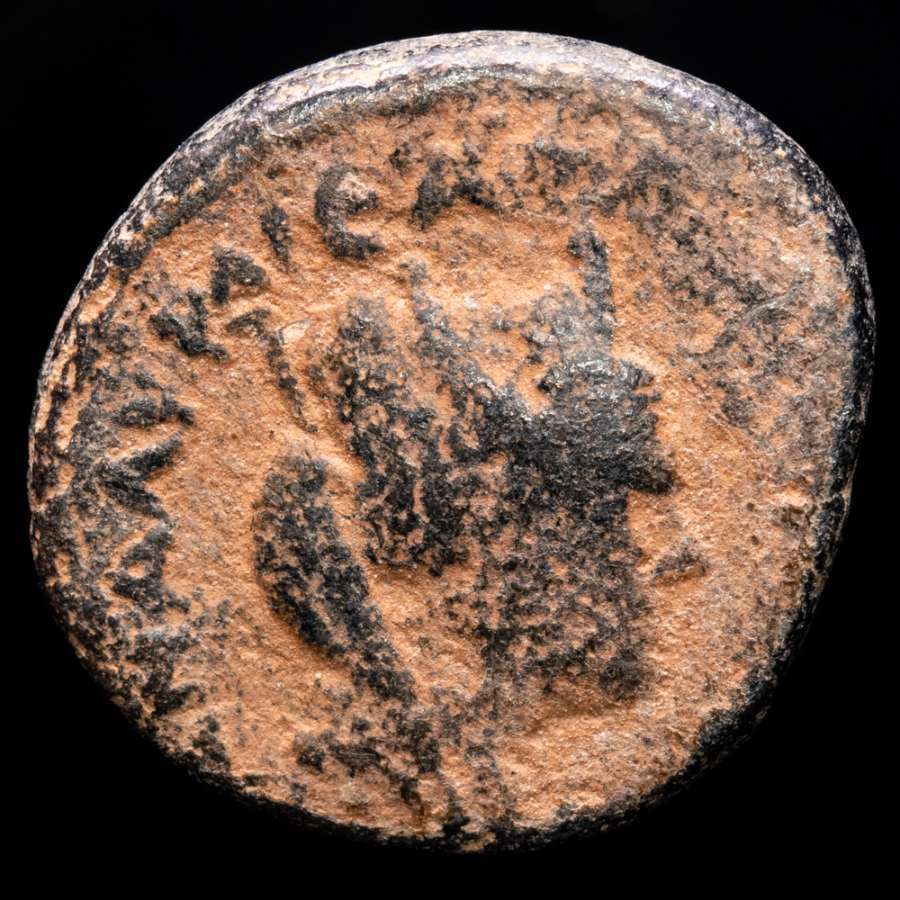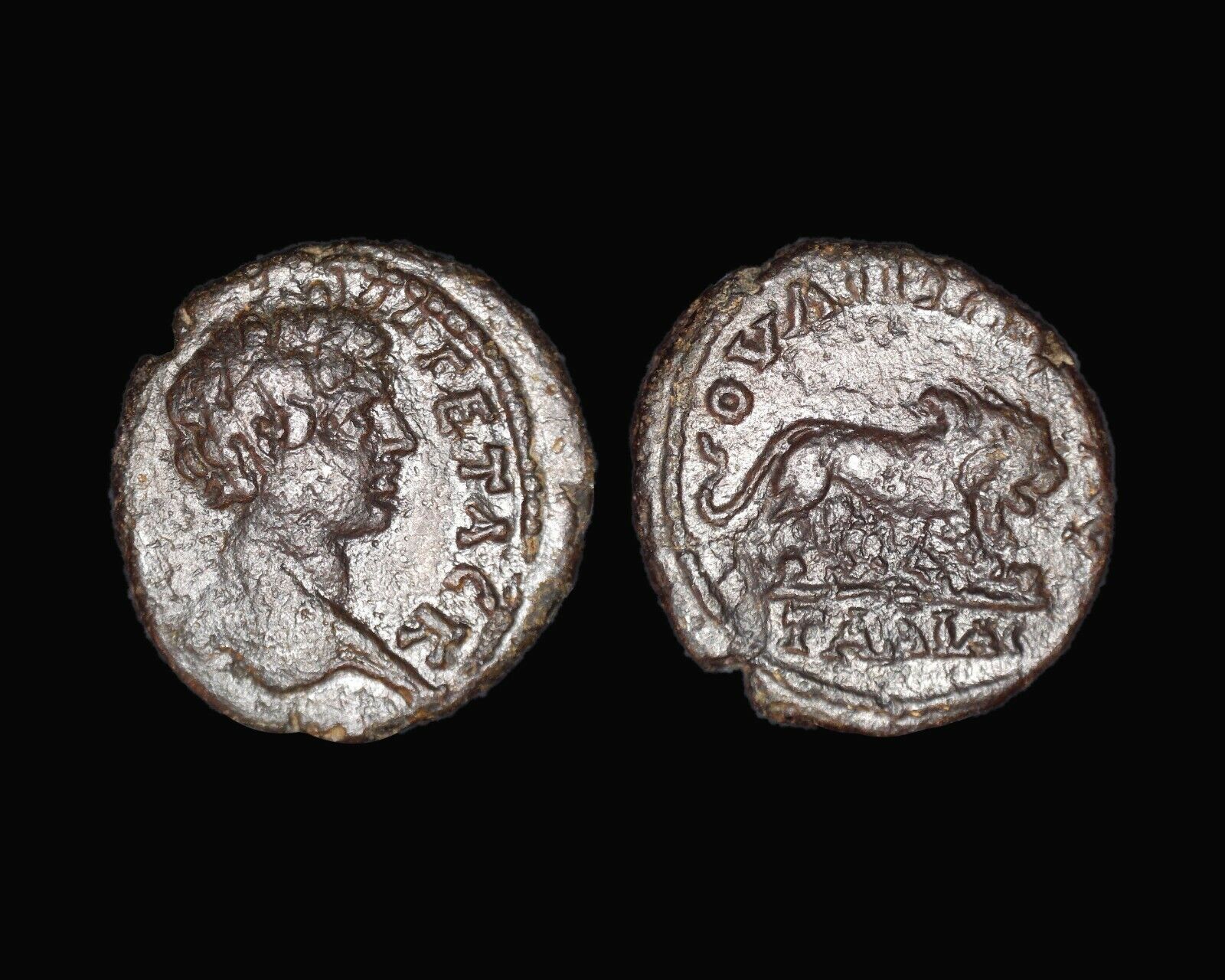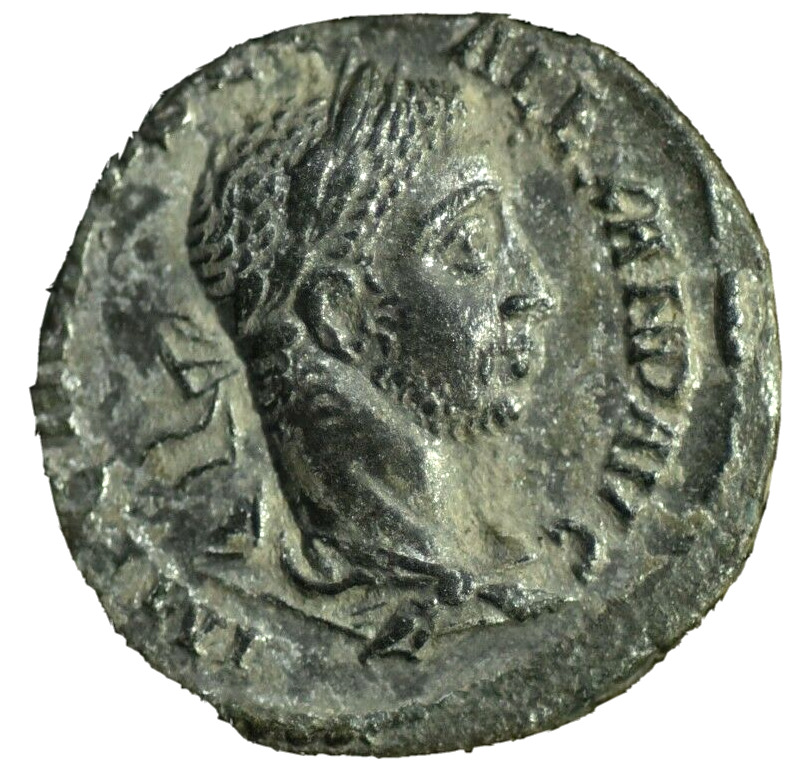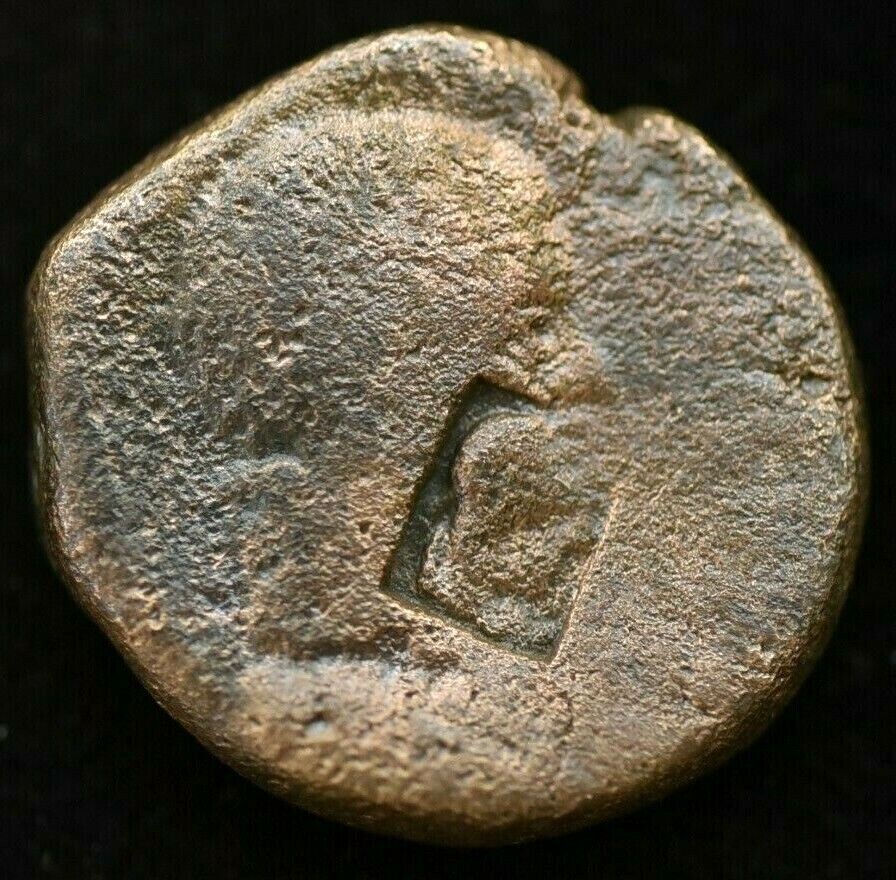-40%
ELAGABALUS Bunch of Grapes Bacchus MARCIANOPOLIS Rare Ancient Roman Coin i49372
$ 68.64
- Description
- Size Guide
Description
Item:i49372
Authentic Ancient Roman Coin of:
Elagabalus
-
Roman Emperor
: 218-222 A.D. -
Bronze 17mm (2.43 grams) from the Roman provincial city
Marcianopolis in Moesia Inferior Struck 218-222 A.D.
Laureate head right.
MAPKIANOΠOΛITΩN, Bunch of grapes, associated with Dionysus
.
You are bidding on the exact item pictured, provided with a Certificate of Authenticity and Lifetime Guarantee of Authenticity.
Dionysus
is the god of the grape harvest, winemaking and wine, of ritual madness, fertility, theatre and religious ecstasy in
Greek mythology
. Alcohol, especially
wine
, played an important role in Greek
culture with Dionysus being an important reason for this life style. His name, thought to be a
theonym
in
Linear B
tablets as
di-wo-nu-so
(
KH
Gq 5 inscription), shows that he may have been worshipped as early as c. 1500–1100 BC by
Mycenean Greeks
; other traces of the Dionysian-type cult have been found in ancient
Minoan Crete
. His origins are uncertain, and his cults took many forms; some are described by ancient sources as Thracian, others as Greek. In some cults, he arrives from the east, as an Asiatic foreigner; in others, from
Ethiopia
in the South. He is a god of
epiphany
, "the god that comes", and his "foreignness" as an arriving outsider-god may be inherent and essential to his cults. He is a major, popular figure of
Greek mythology
and
religion
, and is included in some lists of the
twelve Olympians
. Dionysus was the last god to be accepted into Mt. Olympus. He was the youngest and the only one to have a mortal mother. His festivals were the driving force behind the development of
Greek theatre
. He is an example of a
dying god
.
The earliest cult images of Dionysus show a mature male, bearded and robed. He holds a
fennel
staff, tipped with a pine-cone and known as a
thyrsus
. Later images show him as a beardless, sensuous, naked or half-naked androgynous youth: the literature describes him as womanly or "man-womanish". In its fully developed form, his central cult imagery shows his triumphant, disorderly arrival or return, as if from some place beyond the borders of the known and civilized. His procession
(
thiasus
)
is made up of wild female followers (
maenads
) and bearded
satyrs
with
erect penises
. Some are armed with the
thyrsus
, some dance or play music. The god himself is drawn in a chariot, usually by exotic beasts such as lions or tigers, and is sometimes attended by a bearded, drunken
Silenus
. This procession is presumed to be the cult model for the human followers of his
Dionysian Mysteries
. In his
Thracian
mysteries, he wears the
bassaris
or
fox
-skin, symbolizing a new life. Dionysus is represented by city religions as the protector of those who do not belong to conventional society and thus symbolizes everything which is chaotic, dangerous and unexpected, everything which escapes human reason and which can only be attributed to the unforeseeable action of the gods.
Also known as
Bacchus
, the name adopted by the
Romans
and the frenzy he induces,
bakkheia
. His
thyrsus
is sometimes wound with ivy and dripping with honey. It is a beneficent wand but also a weapon, and can be used to destroy those who oppose his cult and the freedoms he represents. He is also called
Eleutherios
("the liberator"), whose wine, music and ecstatic dance frees his followers from self-conscious fear and care, and subverts the oppressive restraints of the powerful. Those who partake of his mysteries are possessed and empowered by the god himself. His cult is also a "cult of the souls"; his maenads feed the dead through blood-offerings, and he acts as a divine communicant between the living and the dead.
In Greek mythology, he is presented as a son of
Zeus
and the mortal
Semele
, thus semi-divine or
heroic
: and as son of Zeus and
Persephone
or
Demeter
, thus both fully divine, part-
chthonic
and possibly identical with
Iacchus
of the
Eleusinian Mysteries
. Some scholars believe that Dionysus is a
syncretism
of a local Greek nature deity and a more powerful god from
Thrace
or
Phrygia
such as
Sabazios
or
Zalmoxis
.
Marcianopolis
, or
Marcianople
was an ancient Roman city in
Thracia
. It was located at the site of modern day
Devnya
,
Bulgaria
.
The city was so renamed by Emperor
Trajan
after his sister
Ulpia Marciana
, and was previously known as Parthenopolis. Romans repulsed a
Gothic
attack to this town in
267
(or
268
), during the reign of
Gallienus
.
Diocletian
made it the capital of the
Moesia Secunda
province.
Valens
made it his winter quarters in 368 and succeeding years, Emperor
Justinian I
restored and fortified it. In 587, it was sacked by the king of the
Avars
but at once retaken by the Romans. The Roman army quartered there in 596 before crossing the Danube to assault the Avars.
Between 893 and 972 it was one of the most important medieval cities in south-eastern Europe.
Elagabalus
(pronounced El-uh-GAB-uh-lus, c. 203 – March 11, 222), also known as
Heliogabalus
or
Marcus
Aurelius Antoninus
, was a
Roman Emperor
of the
Severan dynasty
who reigned from 218 to 222. Born
Varius Avitus Bassianus
, he was
Syrian
on his mother's side, the son of
Julia Soaemias
and
Sextus Varius Marcellus
, and in his early youth he served as a priest of the god
El-Gabal
at his hometown,
Emesa
. Upon becoming emperor he took the name Marcus Aurelius Antoninus Augustus, and was called Elagabalus only a long time after his death.
In 217, the emperor
Caracalla
was murdered and replaced by his
Praetorian prefect
, Marcus Opellius
Macrinus
. Caracalla's maternal aunt,
Julia Maesa
, successfully instigated a revolt among the
Third Legion
to have her eldest grandson, Elagabalus, declared as emperor in his place. Macrinus was defeated on June 8, 218, at the
Battle of Antioch
, upon which Elagabalus, barely fourteen years old, ascended to the imperial power and began a reign that was marred by infamous controversies, to put it mildly.
During his rule, Elagabalus showed a disregard for Roman religious traditions and sexual taboos. He was married as many as five times and is reported to have prostituted himself in the imperial palace. Elagabalus replaced
Jupiter
, head of the
Roman pantheon
, with a new god,
Deus Sol Invictus
, and forced leading members of Rome's government to participate in religious rites celebrating this deity, which he personally led.
Amidst growing opposition, Elagabalus, only 18 years old, was assassinated and replaced by his cousin
Alexander Severus
on March 11, 222, in a plot formed by his grandmother, Julia Maesa, and members of the
Praetorian Guard
. Elagabalus developed a reputation among his contemporaries for eccentricity, decadence, and zealotry which was likely exaggerated by his successors and political rivals. This propaganda was passed on and, as a result, he was one of the most reviled Roman emperors to early historians. For example,
Edward Gibbon
wrote that Elagabalus "abandoned himself to the grossest pleasures and ungoverned fury." "The name Elagabalus is branded in history above all others" because of his "unspeakably disgusting life," wrote
B.G. Niebuhr
.
Frequently Asked Questions
How long until my order is shipped?:
Depending on the volume of sales, it may take up to 5 business days for shipment of your order after the receipt of payment.
How will I know when the order was shipped?:
After your order has shipped, you will be left positive feedback, and that date should be used as a basis of estimating an arrival date.
After you shipped the order, how long will the mail take?
USPS First Class mail takes about 3-5 business days to arrive in the U.S., international shipping times cannot be estimated as they vary from country to country. I am not responsible for any USPS delivery delays, especially for an international package.
What is a certificate of authenticity and what guarantees do you give that the item is authentic?
Each of the items sold here, is provided with a Certificate of Authenticity, and a Lifetime Guarantee of Authenticity, issued by a world-renowned numismatic and antique expert that has identified over 10000 ancient coins and has provided them with the same guarantee. You will be quite happy with what you get with the COA; a professional presentation of the coin, with all of the relevant information and a picture of the coin you saw in the listing.
Compared to other certification companies, the certificate of authenticity is a -50 value. So buy a coin today and own a piece of history, guaranteed.
Is there a money back guarantee?
I offer a 30 day unconditional money back guarantee. I stand behind my coins and would be willing to exchange your order for either store credit towards other coins, or refund, minus shipping expenses, within 30 days from the receipt of your order. My goal is to have the returning customers for a lifetime, and I am so sure in my coins, their authenticity, numismatic value and beauty, I can offer such a guarantee.
Is there a number I can call you with questions about my order?
You can contact me directly via ask seller a question and request my telephone number, or go to my About Me Page to get my contact information only in regards to items purchased on eBay.
When should I leave feedback?
Once you receive your order, please leave a positive. Please don't leave any negative feedbacks, as it happens many times that people rush to leave feedback before letting sufficient time for the order to arrive. Also, if you sent an email, make sure to check for my reply in your messages before claiming that you didn't receive a response. The matter of fact is that any issues can be resolved, as reputation is most important to me. My goal is to provide superior products and quality of service.
